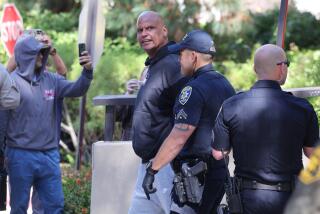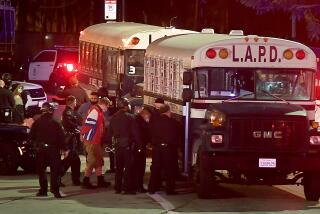TV’S BATTLE IN SOUTH AFRICA
“Help us. Please help us. Please.”
Haunting words. Bishop Desmond Tutu was only half-speaking to Peter Jennings. In reality, the black South African leader --a brilliant media tactician and his nation’s most visible and eloquent anti-apartheid figure--was going over Jennings’ head and directly addressing the American people.
In doing so, he appeared to be risking arrest.
Tutu made his soft, but emotional plea in an extraordinary appearance Wednesday on ABC’s “World News Tonight.” The interview was one of TV’s rare, direct links to black South Africa since the white minority government’s June 12 declaration of a national state of emergency that virtually eliminated independent news coverage there.
The taped satellite communication between Jennings in New York and the Nobel laureate Tutu in his Johannesburg home consumed more than half of the newscast. It demonstrated anew how closely TV resembles a great world power in being at once omnipotent and impotent.
All the media are burned by government-imposed constraints on reporting events in strife-torn South Africa. But especially TV.
If TV news possesses the awesome potential to deliver the dissident Tutu to the United States like an overseas video letter, it is also feeble and anemic, a painter without paints, when denied pictures.
“World News Tonight” had Tutu but, like the other network newscasts that night, contained little else from South Africa beyond government handouts.
As Ted Koppel noted Wednesday on ABC’s “Nightline,” the falling-tree-in-the-forest thesis can be applied to South Africa. If civil unrest, government repression and violence aren’t reported, do they exist? If the government continues to allow only its own filtered version of events to be dribbled out through its own spokesmen, will the victims’ cries ultimately be stilled?
ABC News said it requested the Tutu interview, not vice versa. The fuzziness of the state-of-emergency restrictions required that Tutu’s attorney and one representing ABC be in the room with Tutu during the taping.
Live interviews are forbidden, but this one was on tape. Yet, for again urging the United States to impose economic sanctions against South Africa (a tough bill to that effect was passed Wednesday by the House), Tutu risked arrest for subversion, Jennings said.
It was also possible that the crafty Tutu was trying to use TV to goad the government into arresting him, knowing that his jailing would increase international outrage and focus even more attention on his people’s plight.
“Would you wish us to censor anything you said--for your benefit?” Jennings asked Tutu.
“No, no,” Tutu replied emphatically.
In addition to urging economic sanctions, Tutu questioned the government’s casualty figures and again chastised the United States, Britain and West Germany for their strong economic ties to South Africa. He charged that President Reagan’s opposition to economic sanctions made him, in effect, an “accomplice” of apartheid.
No one knows what effect Tutu’s latest plea will have in the United States. One wonders, though, if history would have been altered if victims in earlier times would have been able to go on TV and say, “Help us. Please help us. Please.”
There have been other strong voices on TV this week in connection with South Africa: President Pieter W. Botha defending the state of emergency Tuesday on “Nightline”; the florid, emotional House oratory preceding Wednesday’s surprising sanctions vote aired live on cable’s C-SPAN.
What about those muted press voices from South Africa, though? Are reporters giving in too easily to the restrictions? Koppel asked Wednesday on “Nightline.”
It’s true, as New York Times Executive Editor Abe Rosenthal noted on the program, that Amnesty International and others are providing alternative sources of news about South Africa. Some information is being slipped through the cracks.
But the media’s worst enemy is self-censorship, ABC’s Richard Threlkeld insisted. Fearing imprisonment or expulsion for violating the coverage ban, he said, reporters may tend to censor themselves on so-called smaller stories, hoping to stay around to report the bigger stories. “That’s when we become part of their system,” Threlkeld said.
Jennings urged reporters to “test the limits,” lest they become “accomplices to a South African policy.”
CBS cameraman Wim de Vos doesn’t even know what limits he violated. At 5:06 p.m. last Friday, a telex arrived at the CBS bureau in Johannesburg notifying De Vos that he was being expelled.
De Vos, a Dutch citizen who had lived in South Africa for a decade, was given no reason for the action. He was given until midnight Tuesday to leave.
On that day, the police picked him up in court, where he had just lost his final appeal to stay in the country, and whisked him to the airport where oodles of media were waiting to film his forced departure. The police stopped them.
“I left so fast that I had to leave everything behind,” De Vos said Wednesday by telephone from London. “All I had with me was my briefcase.”
De Vos, 39, had been arrested several times by the police while on the job and was part of a CBS crew that was ordered out of the country in March but ultimately allowed to stay. Even before the present state of emergency, the government abused the media, De Vos said. “They treat you like dirt.”
He suspects that an arrest shortly before his expulsion may have cost him his chance to remain in the country with his South African wife and three young children.
De Vos, a CBS producer and soundman and an Associated Press photographer were in Cape Town covering an anti-apartheid demonstration of about 25 sign-carrying black youths.
“About 15 police arrived and told the kids to disperse and they did,” De Vos said. “The police then went around the corner and we followed them and filmed them retreating to their cars. When they got about half back, the policeman in charge gave the order to ‘Get them!’ He had to say it four times before the other police realized he meant us.”
De Vos said that the police began hustling the media people into vans and when he protested “a policeman kicked my feet from underneath me. When I protested again, they dragged me to the van and they took us to the police station.”
The others were released after about 30 minutes, but De Vos was held more than four hours. He said he was shouted at, berated and charged with assaulting a policeman, resisting arrest and obstructing the police in the performance of their duties. He was then released on bail.
De Vos said he may now work for CBS in London and hoped his family would be able to join him there in a month. “South Africa is a beautiful country with a variety of people,” he said. “ Some of them are nice.”
More to Read
Sign up for Essential California
The most important California stories and recommendations in your inbox every morning.
You may occasionally receive promotional content from the Los Angeles Times.










